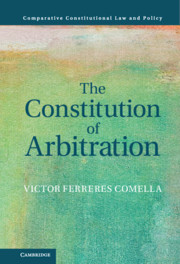Book contents
- The Constitution of Arbitration
- Comparative Constitutional Law and Policy
- The Constitution of Arbitration
- Copyright page
- Dedication
- Contents
- Acknowledgments
- Introduction
- Part I Arbitration and Private Law
- Part II Investment Treaty Arbitration
- 6 The Rise of Investment Treaty Arbitration
- 7 Privileging Foreign Investors?
- 8 Adjudicative Coherence and Democratic Checks on Arbitral Jurisprudence
- 9 Investment Treaty Arbitration, Regional Integration, and Fragmentation of International Law
- Part III State-to-State Arbitration
- Index
7 - Privileging Foreign Investors?
The Equality Challenge
from Part II - Investment Treaty Arbitration
Published online by Cambridge University Press: 11 March 2021
- The Constitution of Arbitration
- Comparative Constitutional Law and Policy
- The Constitution of Arbitration
- Copyright page
- Dedication
- Contents
- Acknowledgments
- Introduction
- Part I Arbitration and Private Law
- Part II Investment Treaty Arbitration
- 6 The Rise of Investment Treaty Arbitration
- 7 Privileging Foreign Investors?
- 8 Adjudicative Coherence and Democratic Checks on Arbitral Jurisprudence
- 9 Investment Treaty Arbitration, Regional Integration, and Fragmentation of International Law
- Part III State-to-State Arbitration
- Index
Summary
Investment treaties grant foreign investors certain protections, which they can invoke before international arbitral tribunals. Those treaties do not apply to local investors. This different treatment raises constitutional objections based on the principle of equality. Courts in various jurisdictions have had to deal with this challenge when ruling on the constitutionality of investment treaties. The different treatment that derives from the current investment regime is sometimes defended on the instrumental ground that it helps attract external capital, which is beneficial for the economy of the host state. Another theory, in contrast, argues that investment treaties are necessary to counteract the potential vulnerability of foreigners. The chapter develops an equality-based theory that constitutional courts could use in their decisions, and explores the doctrinal legal consequences that should follow from it.
- Type
- Chapter
- Information
- The Constitution of Arbitration , pp. 123 - 142Publisher: Cambridge University PressPrint publication year: 2021

